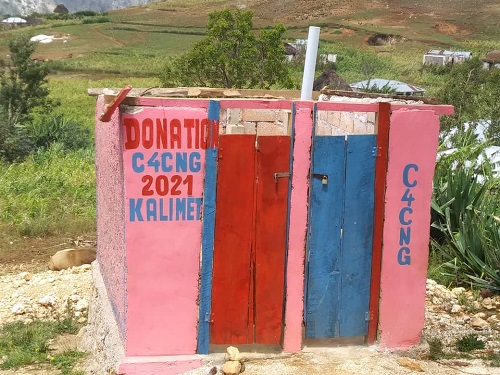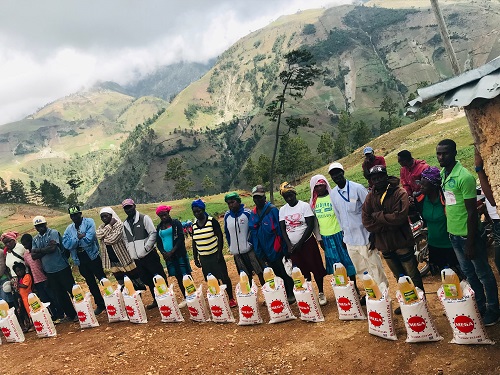Special Report: Haiti
Ascending into chaos
UPDATE: Since writing that it couldn’t get worse (after the assassination of Haiti’s president), a 7.2-magnitude earthquake struck, killing thousands, and another tropical storm crossed the island nation.
By Gary Fallesen, founding president, Climbing For Christ
The man who called himself “Après Dieu” (essentially, second only to God) met his maker on July 7. Haiti’s president, Jovenel Moïse, was assassinated in his home in Port-au-Prince.
A country synonymous with crisis seemingly could not get worse. Or could it?
Lawlessness (kidnapping, carjacking, armed robbery, gang violence), a dysfunctional government, civil unrest, fuel and food shortages, and rampant COVID-19 already had Haiti tagged “Level 4: Do Not Travel” for outsiders and was a hellhole for its population of 11-million-plus. Chaos would be a step up in Haiti.
Urban warfare had become a way of life in recent months. It has affected even those living in the countryside.
Wilene Gerard, a Climbing For Christ New Generation (C4CNG) member and single mother of four children, had her home invaded and most of her possessions stolen. C4CNG founder and leader Gilbert Lindor saw a video of the crime “where some people accompanied by authorities” broke into Wilene’s house. She and her children are now living at her pastor’s home.
“I am Haitian, and I do not trust many of them,” said Lindor, our Kingdom worker on Hispaniola and a medical school student in Santo Domingo, Dominican Republic, who came from the mountain village of Gentilhomme, Haiti.
“They (Haitians) are very bad. They think they are intelligent, and they are not! They say one thing then change it for others. They have a lot of evil in their hearts.”
Haiti has been and is the poorest country in the Western Hemisphere. Sixty percent of the population reportedly lives on less than $1.90 USD a day.
Hardship is a way of life.
Climbing For Christ has worked in Haiti since 2005 when, on just our third Evangelic Expedition, God led us to Gentilhomme high up the slopes of 8,793-foot (2,680-meter) Pic la Selle. We built three churches, which also doubled as schools in villages where there were no schools. Today, we support four schools, and more than 400 children are receiving an education.
In a country where nearly 40 percent of the population is illiterate, education is important.
But building churches and schools, providing clean water, delivering food and clothing, and helping with disasters (ranging from COVID-19 to hurricanes) is not Climbing For Christ’s primary purpose. Jesus did not send us with that assignment; He sends us “into all the world to preach the Good News to everyone” (Mark 16:15). “Therefore, go and make disciples of all nations [or peoples], baptizing them in the name of the Father and the Son and the Holy Spirit. Teach these new disciples to obey all the commands I have given you” (Matthew 28:19-20).
Preach, teach, and make disciples. That is what Jesus commanded. There is nothing wrong with those other things (funding schools, food, health care) if the spiritual takes priority.
Especially in a country where the population is alleged to be 55 percent Catholic and 28.5 percent Protestant, but people still practice Vodou. Vodou was recognized as an official religion in 2003.
Vodou is a syncretism of the folk religions of Western Africa and Catholicism. Adherents consider themselves “servants of the spirits,” and seek to appease demons through the worship and use of idols. They do not trust that “there is one God, the Father, by whom all things were created, and for whom we live. And there is one Lord, Jesus Christ, through whom all things were created, and through whom we live” (1 Corinthians 8:6).
This message is shared by C4CNG every time they serve the many physical needs.
“Please pray for our Haitian compatriots,” Gilbert said. “I also ask for your prayers for C4CNG that is doing an extraordinary job in Haiti but is attacked every day and threatened with the county’s problems.” 
The Elsa effect

The roofless latrine in Kalimet in the wake of Tropical Storm Elsa. (Photos by C4CNG)
“The tropical storm shook the four communities we are working with,” Gilbert said, referring to Gentilhomme, Kalimet, Majon, and Malasi. “In each one, the vast majority of citizens lost their crops. In Kalimet, (Elsa) took the roof of the latrine we recently built for the school and the church, and (Elsa) took part of the roof of four houses.”
The mostly have-nots

What price love? A burned out house.
Inequality is also a way of life in Haiti, where the gap between impoverished citizens and wealthy political elite continues to grow. The New York Times reported yesterday about a Haitian senator with a villa in Montreal that is valued at $3.4 million.
One observer told The Economist there is “apartheid-like exclusion” in Haiti. As with other circumstances, this also spills over into the mountains. In Kalimet, a family had its house burned because their son married a girl whose family did not want her to marry someone so poor. “The young woman’s parents promised to burn down the house and some five days later the promise was fulfilled,” Gilbert said.
“Who is from the poor class, even though he becomes rich, he should not consider himself rich and much less have a position in society. We have a mental problem (in Haiti). They (believe) if someone studies in the mountains, he should not be above the one who studies in the city. The one who is a minor should not be above the elders.”
Those who have-not are condemned to that life, no matter how they might be blessed to escape this (for lack of a better word) caste.
The mission continues

Food distributed this month in the mountain village of Kalimet.
Land has been donated to build a larger school in Kalimet. Or has it? Some family members agree it would be good for the village, others want something in return.
We continue to pray for resolution. We have the funds to complete this project.
At the same time, C4CNG is planning a mission trip within the larger mission. This would be a “medical operation,” said Gilbert, who is halfway through six years of medical school. The team would like to work in Kalimet and Majon, doing health-care workshops and treating the sick. The team needs $3,000-$4,000 for this trip.
“Life in Haiti is expensive,” Gilbert said, and with COVID-19 the needs are greater. To date, Climbing For Christ has distributed $14,450 in aid during the COVID-19 pandemic.
How can you help? PRAY: Pray for C4C’s New Generation and the hard work these (mostly Haitian) young people are doing. GIVE: We have five regular donors who support the monthly funding of work in Haiti. We are grateful for their hearts for Haiti. But we have averaged more than $5,500 a month for Mission: Haiti in 2021. We need others to step up and help us financially. Send your gift to Climbing For Christ, c/o Mission: Haiti, P.O. Box 16290, Rochester, NY 14616-0290 USA or CLICK HERE to give online via PayPal. In Canada, make cheques payable to The Great Commission Foundation, and on the memo line add Climbing For Christ CANADA. Mail your support to: The Great Commission Foundation, P.O. Box 14006, Abbotsford, BC V2T 0B4. Or CLICK HERE to give online.
The final Word
“And then he told them, ‘Go into all the world and preach the Good News to everyone.” – Mark 16:15 (NLT)
1488